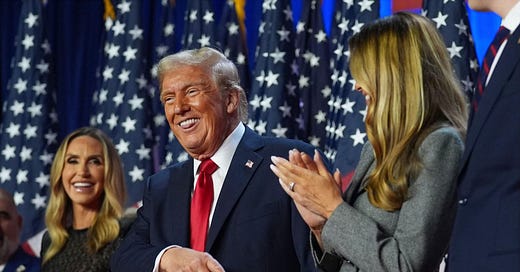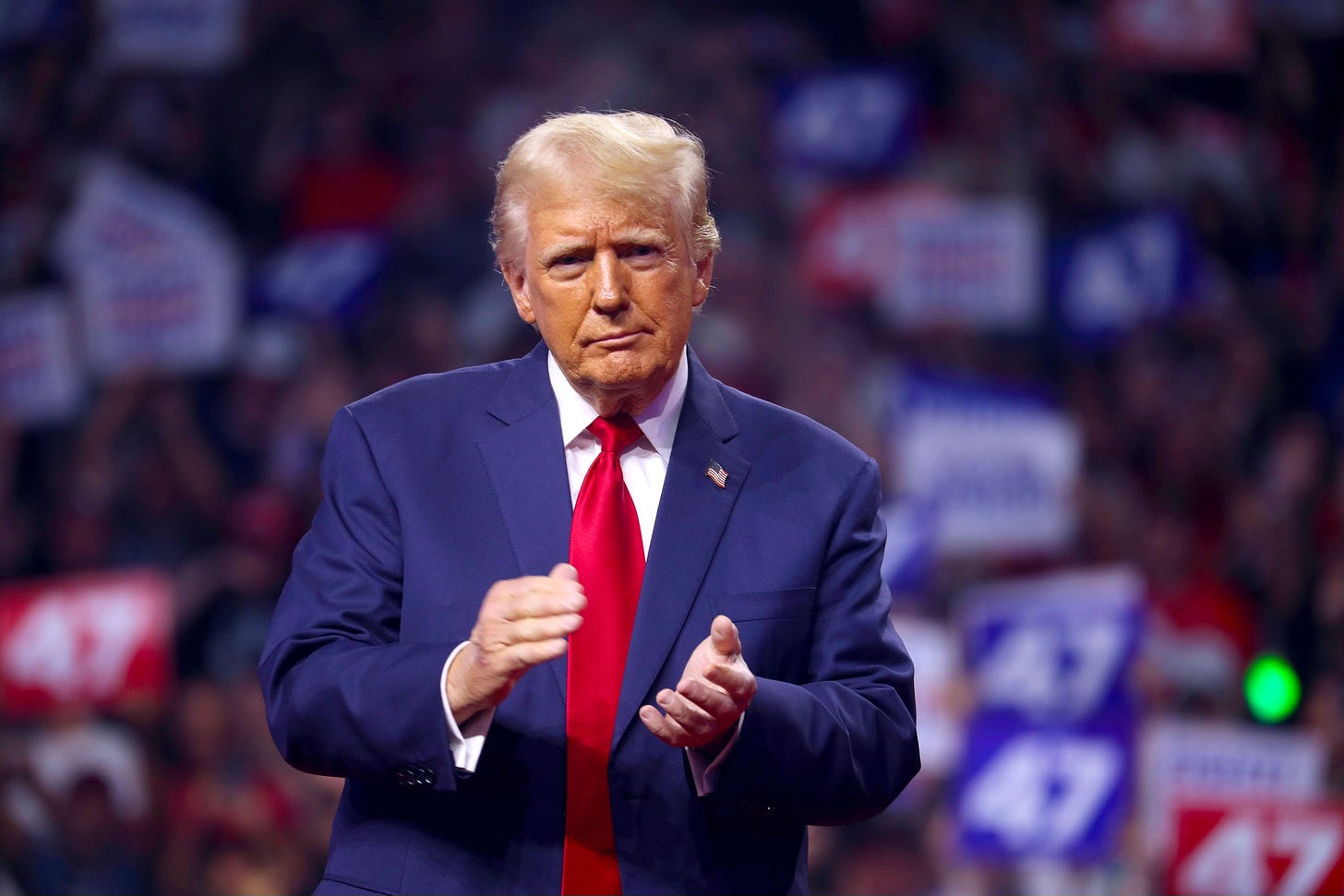Two impeachments, 34 felonies and a couple of assassination attempts later, Donald Trump has pulled off one of the biggest comebacks in political history, leaving the world on edge as it mulls over the enormous ramifications of his resounding victory.
Teflon Trump has not only secured a state sweep swing, he has eclipsed his 2016 performance and become the first Republican contender in 20 years to win the popular vote.
We are still waiting for Kamala Harris to make any public address to her supporters or concede defeat to Trump, but she has reportedly made a private phone call to congratulate him.
Keir Starmer commended Trump’s “historic victory” today, adding that he was “looking forward” to working with him. But beneath the warm words, the so-called special relationship is set to be tested.
Those in America will be largely mulling over the implications of domestic policies today. Such as his pledge to conduct the biggest mass deportation of undocumented migrants in American history, the impact of a Republican victory on abortion, or whether Trump can be expected to follow through on his promise to revive the American economy.
But, as war and uncertainty grip large chunks of the world, those abroad will be preparing for Donald Trump’s erratic foreign policy.
For Ukrainians, his victory will prove especially consequential.
Trump’s “America first” policy resonated with large swathes of the US electorate who complain that billions of dollars spent on a faraway European war could be better spent at home. Now, we will find out what Trump’s vague promise to end the war in Ukraine “on day one” actually entails. And if it really will mean cutting aid to Kyiv and forcing Zelensky to sign a humiliating “peace” deal, giving Putin the eastern third of Ukraine and potentially emboldening him to keep pushing against Nato’s borders.
Speaking of NATO, for much of the past year, Europeans have been asking if the alliance can be “Trump-proofed,” hoping they would never have to find out. Trump’s threats to pull out of the alliance and his - not entirely unreasonable - resentment at America’s disproportionate NATO spending will intensify pressure on European nations to spend much more on defence. Labour has yet to commit to a date for meeting its 2.5 per cent pledge.
As for the Middle East, Trump has promised to “bring peace” to the region quickly, insisting the “killing has to stop”. But has not laid out any policies for achieving said peace.
On Israel, the change in policy under Trump is likely to be far less pronounced than on Ukraine. While Democrats have lost votes in this election over Gaza, there is little to suggest Trump would take up the Palestinian cause any more readily. During his last stint in power, Trump enacted strongly pro-Israel policies, such as naming Jerusalem as Israel’s capital and moving the US embassy there from Tel Aviv, and Netanyahu once described him as the “best friend that Israel has ever had in the White House”.
With wars raging on multiple fronts, there are plenty of reasons to be worried about Trump 2.0. Though it is also true that even foreign policymakers who’ve spent months preparing for his possible return to the White House cannot really be sure of how exactly this will all unfold.
Trump is, after all, erratic and impulsive. As Philippe Dickinson, from the Atlantic Council’s Transatlantic Security Initiative, puts it, “his diplomatic approach is to always keep others - friend and foe alike - off balance. It is to make a virtue of his unpredictability”.
Despite his volatility, Trump has repeatedly pointed out that, the last time he was in power, the world was a less dangerous place.
He’s not wrong. Cause or correlation? Trump, as to be expected, insists this is no coincidence, but rather a clear endorsement of his strong leadership of the free world. He has, for instance, said that Hamas’s October 7 attack on Israel would never have taken place had he still been president, because of his “maximum pressure” policy on Iran.
Trump claims he can calm a "world on fire", and American voters have taken him at his word. Ukrainians could be first in line to pay the price.
Caitlin Allen
Deputy Editor
ON REACTION TODAY
Josh Schlicht
Trump II - Washington wakes up to a Republican blowout
Maggie Pagano
Trump won because Americans feel poorer
Gerald Malone
Trump's victory was predicted by yours truly in February
ALSO KNOW
Tory guerrilla warfare - Iain Duncan Smith has reportedly told Kemi Badenoch’s first shadow cabinet meeting that the Tories will need to adopt the tactics of guerilla warfare in order to beat Labour.
Le Pen faces charges - Hard-right French politician, Marine Le Pen, is facing charges of embezzling millions of euros which could bar her from public office for up to 10 years. She condemned the court’s “unfair treatment” and dismissed testimonies by her party’s former MEPs as desire for revenge or motivated by fear of being prosecuted.
Israeli protests - Thousands in Israel have taken to the streets in a show of anger over Netanyahu sacking Yoav Gallant, his defence minister, over a “crisis of trust.” Israel Katz, who Netanyahu has described as a “bulldozer” will take over the role.
AfD expels members - Germany’s AfD party are set to expel three members arrested for suspected involvement with a group accused of planning an extremist coup in eastern Germany. The Saxonian Separatists, a group of 15-20 extremists, were allegedly planning to install a new system inspired by Nazism.
FIVE THINGS
Curated by Alexandra Luca
Iran: undressing protest shows how women are still fighting even as morality laws get harsher, in The Conversation
Keir Starmer on Planet Trump. Tom Clark in Prospect
Ukrainian soldiers are learning Korean as they face Kim Jong-un’s troops, reports Catherine Philp in The Times
Kamala Harris’s Democratic betrayal, in Compact Magazine
Spain’s floods have unleashed the politics of anger, writes Jack Smith in The New Statesman








